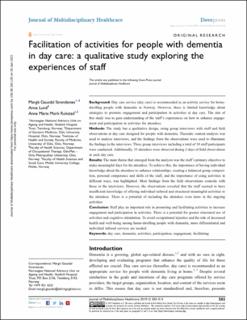Facilitation of activities for people with dementia in day care : a qualitative study exploring the experiences of staff
Peer reviewed, Journal article
Published version
Permanent lenke
https://hdl.handle.net/11250/3096644Utgivelsesdato
2019Metadata
Vis full innførselSamlinger
Sammendrag
Background: Day care service (day care) is recommended as an activity service for home-dwelling people with dementia in Norway. However, there is limited knowledge about strategies to promote engagement and participation in activities at day care. The aim of this study was to gain understanding of the staff’s experiences on how to enhance engagement and participation in activities for attendees. Methods: The study has a qualitative design, using group interviews with staff and field observations at day care designed for people with dementia. Thematic content analysis was used to analyze interviews, and the findings from the observations were used to illuminate the findings in the interviews. Three group interviews including a total of 10 staff participants were conducted. Additionally, 35 attendees were observed during 2 days of field observations at each day care. Results: The main theme that emerged from the analysis was the staff’s primary objective to make meaningful days for the attendees. To achieve this, the importance of having individual knowledge about the attendees to enhance relationships, creating a balanced group composition, personal competence and skills of the staff, and the importance of using activities in different ways, was highlighted. Most findings from the field observations coincide with those in the interviews. However, the observations revealed that the staff seemed to have insufficient knowledge of offering individual tailored and structured meaningful activities to the attendees. There is a potential of including the attendees even more in the ongoing activities. Conclusion: Staff play an important role in promoting and facilitating activities to increase engagement and participation in activities. There is a potential for greater structured use of activities and cognitive stimulation. To avoid occupational injustice and the risk of decreased health and well-being among home-dwelling people with dementia, more differentiated and individual tailored services are needed.

